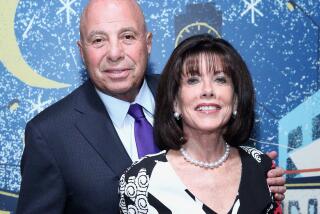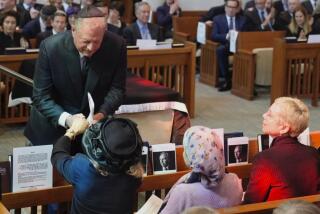You Gotta Have Heart
WASHINGTON ŌĆö The choice of Sen. Joseph I. Lieberman as running mate signaled, once again, the great promise that is Vice President Al Gore. Whether you credit him as the first public figure to warn of global warming or as one of the first Democratic senators to support the Gulf War, Gore has displayed an instinctive political mind often ahead of the pack. In picking Lieberman, Gore showed that side of his political nature that is bold, for he has a foresight most other U.S. politicians lack.
Gore saw the many advantages of Lieberman that virtually every political observer missed. The choice provided a moral anchor to counter President Bill ClintonŌĆÖs moral drift, and it puts into play states the Democrats had virtually abandoned, including Georgia and Florida. With this smart, counterintuitive move, Gore correctly sensed an Orthodox Jew would be acceptable to the vast majority of voters, while anathema to the GOPŌĆÖs religious right, practically daring these bigots to raise religious issues.
This move has to terrify Texas Gov. George W. Bush. After all the effort in Philadelphia to portray Bush as middle of the road, while effectively covering up the right-wing heart and soul of the GOP, it would take only one Pat Robertsonesque comment about Jews to bring the intolerant GOP of the ŌĆś90s back to the front burner. Before Lieberman, the Christian Coalition crowd was already biting their tongues. Imagine the pain theyŌĆÖre in now. And itŌĆÖs only August!
So why is it that Gore, who has such seemingly superb political antennae, is still unable to connect with voters? Even those who enthusiastically confirm his political instincts and intelligence seem unready to embrace him as the bearer of these gifts. Answering this question needs to be the central strategic goal for Gore in Los Angeles this week.
What Gore must provide voters is a link between his mind and his heart. The public clearly recognizes the depth of GoreŌĆÖs mind, yet the heart of his personality remains elusive.
Throughout his political career, Gore has shown flashes of a strong and effective personality that voters could admire. His debate with Ross Perot on the North American Free Trade Agreement comes to mind. There, Gore showed a keen mind but also a personality that allowed him to laugh at himself and even at Perot without looking mean.
Those who saw Gore during his stoic bedside vigil after his son was struck by an automobile, followed by the death of his sister, witnessed a most human side. But in telling both stories during speeches at the last two presidential conventions, Gore underscored his own personality-translation problem. What those who knew him regarded as a glimpse into GoreŌĆÖs heart was seen by many in the public as opportunistic and callous.
Some presidential candidates have the ability to show voters a keen mind while also wearing their political hearts on their sleeves. Presidents Bill Clinton and John F. Kennedy, among Democrats, are examples of such a successful balancing act. Gore has yet to achieve this balance.
Gore may be helped in Los Angeles by simply stepping out of ClintonŌĆÖs shadow and claiming the nomination in his own right. But Clinton casts a long shadow, and, for that reason, Gore should consider finally telling voters what he felt about ClintonŌĆÖs moral lapses and how Gore will be a different kind of president. Risky, perhaps, but candor probably welcomed by voters.
Gore should also contrast himself with Bush by recalling his experiences in Vietnam as a military reporter: What it felt like to be there, what he learned and what he thought about those who avoided service in Vietnam. (Read: Bush, Dick Cheney and Clinton.)
If the direct approach of discussing ClintonŌĆÖs morality feels too risky, Gore might talk about his early days as a reporter on a small-town paper in Carthage, Tenn. He should tell the story about investigating a stolen-car-parts ring in his home county. ItŌĆÖs a personal story of courage and one voters can relate to, as well as an indirect reference to Clinton.
A presidential candidate can win with either a good mind or a big personality, depending on the tenor of the times. Good minds, even lacking big personalities, are demanded during times of crisis, like Jimmy Carter after Watergate. On other occasions, the times demand larger-than-life personalities, such as Dwight D. Eisenhower in the ŌĆś50s or Ronald Reagan in the post Vietnam/Iran ŌĆś80s.
So what is the tenor of today calling for in the next president? Ironically, eight years of Clinton-Gore economic prosperity have made voters soft, less in search of a great mind and more easily seduced by a great personality. If voters in 2000 are forced to choose between the two, BushŌĆÖs personality may win out over GoreŌĆÖs mind.
But given the choice, voters almost always prefer a president with both assets. Those who know Gore well know he possesses a strong personality to go along with his mind. It is now up to Gore to show voters he is a twofer. *
More to Read
Get the L.A. Times Politics newsletter
Deeply reported insights into legislation, politics and policy from Sacramento, Washington and beyond. In your inbox three times per week.
You may occasionally receive promotional content from the Los Angeles Times.










